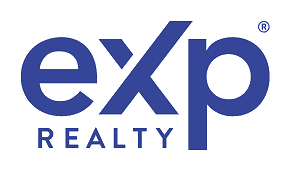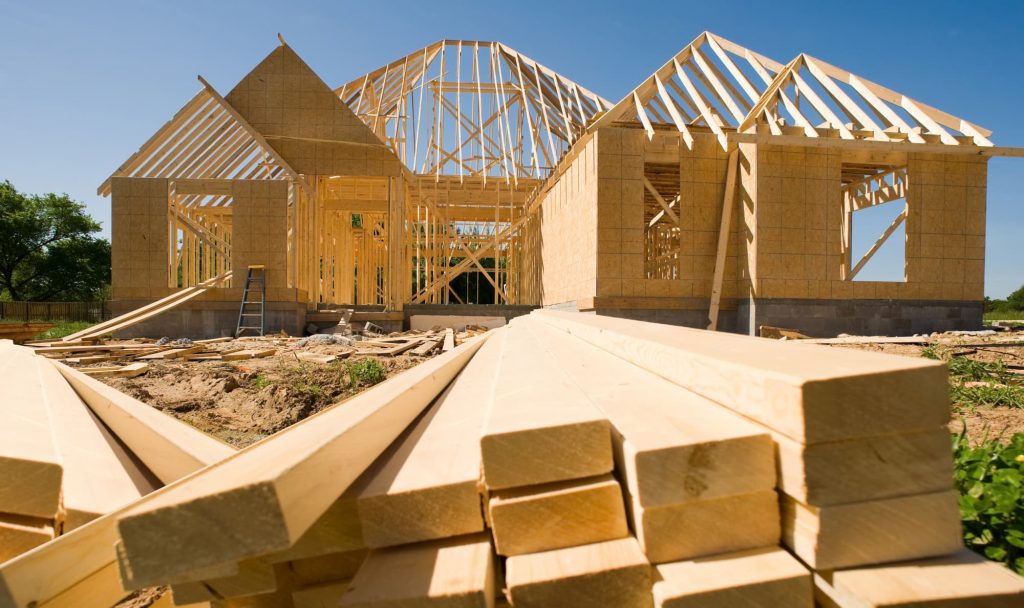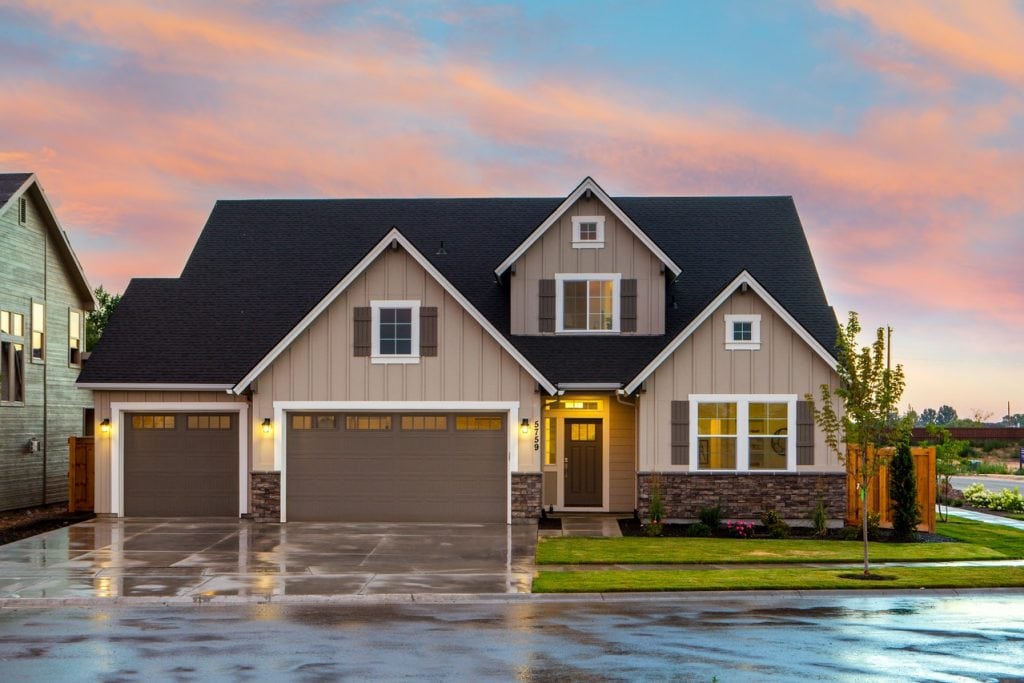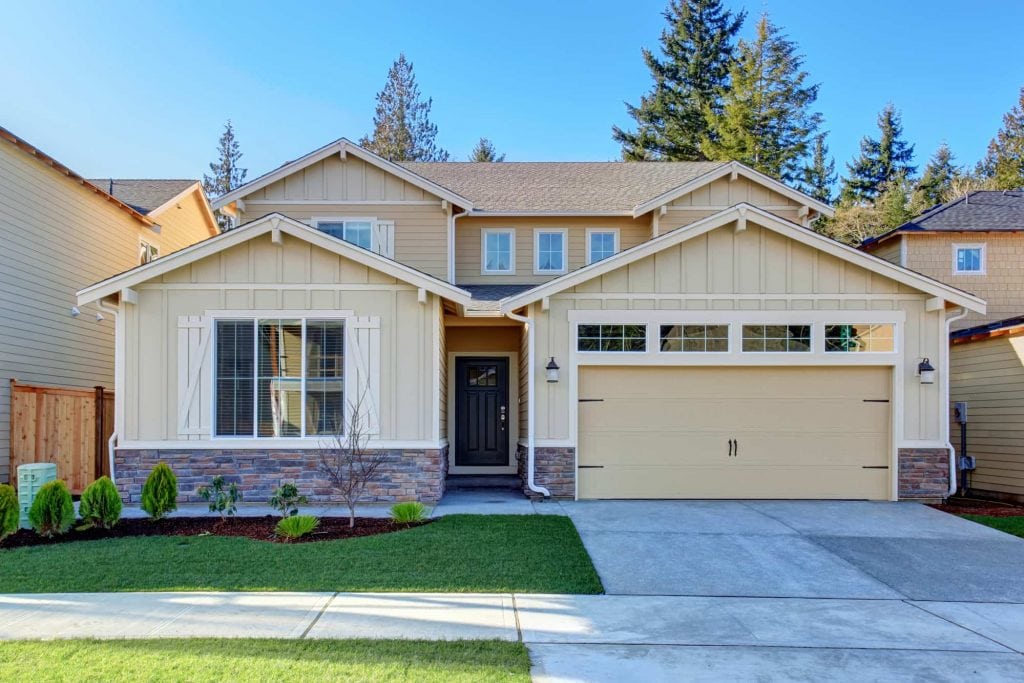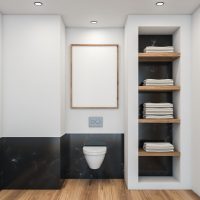Is it cheaper to build a house or buy one? It’s a relatively common question, but it’s not the right question to ask. The real question is, should I buy or should I build? And the answer is it depends.
Cost is only one factor in the build or buy decision. Though it’s an important thing to consider, buyers and builders also need to think about the process and long-term results of either choice.
Below we discuss what affects the average costs of buying vs. building. We also lay out the pros and cons of each in terms of the process and result. Then, we discuss how you might approach this consequential choice, so you can take informed next steps in the decision-making process when building or buying real estate in Georgia or anywhere in the US.
Self-Built vs. New Construction
If you want a new home, you have a couple of options. You could purchase a plot of land and build a house from scratch.
Alternatively, you could look for new construction in your desired housing market. With both options, you’ll likely end up with a home that’s energy efficient, low maintenance, and full of stylistic and modern conveniences.
However, buying new construction is very different from building a home yourself.
The Pros and Cons of New Construction
The Pros
First and foremost, the average cost of a new construction home is usually lower than the cost of building a house from the ground up. Of course, there are some exceptions– certain locations within competitive markets can make building the less expensive route. But, with recent building material shortages and increases in labor costs, those exceptions are increasingly rare.
When you purchase a newly built home, you usually get a neighborhood with it. Brand new construction tends to be within planned or pre-established developments. There may be parks, pools, or other community features that you can access. And the landscaping is likely done or will be done for you.
Buying a new but existing home also means you won’t have to endure building stress. There are few decisions to make and no unexpected costs. You won’t have to worry about gaining building permits or dealing with material shortages.
With new construction, you also may have some bargaining power. If the local real estate market is cooling, you may be able to negotiate a lower price than the developers are asking.
Plus, a new home is move-in ready. You don’t have to wait for the entire home construction to finish in order to move in. As soon as the sale closes, you can start arranging furniture and unpacking bags.
Maybe best of all, new construction tends to appreciate quickly, especially in well-planned developments with enforced HOA restrictions. Depending on the location of the new building, when the development sells out, you’ll likely see instant appreciation for your investment.
The Cons

Plus, you’ll still have to navigate the buying process. You’ll have to consider real estate agent commissions, closing costs, and other fees. On top of that, you may have to deal with stressors like competing bids.
The Pros and Cons of Building a Home
The Pros
Though it’s usually not cheaper to build a home, there are other advantages. For one, you’ll get a completely customized home. You’ll choose the layout and the finishes. Plus, you’ll have to work on all the extra features you’ve been dreaming about.
When building a new home, you don’t have to worry about later renovations inside or out. When it comes to complex landscaping, this is a significant benefit. Putting in a pool, fountain, or other irrigation system is far easier during initial land development.
Building a home also means you won’t have to deal with repairs, at least not right away. Usually, you’ll have a builder’s warranty that covers everything for at least the first year.
On top of all that, you won’t have to deal with the buying process. There are no stressful phone calls with your real estate agent over competing bids, and you won’t have to worry about some of the closing costs.
The Cons
That’s not to say building a home doesn’t come with stress. When you opt for a self-built home, you’ll have to make a lot of decisions, and there will likely be a few unexpected costs. There can also be unforeseen delays due to labor, material, and permitting issues.
Plus, it can be hard to translate your home dreams into physical reality. Everything will be conceptual when working with architects, designers, and engineers. Ensuring these concepts match up with what you want can be difficult.
The Costs of Building a House
We said it’s usually cheaper to purchase new construction than it is to buy a house, but you might wonder: Is it cheaper to build a house in some locations?
The answer is yes. The cost of building a house greatly depends on where you plan to build it and how big you plan to build it.
In a popular area near a booming metropolitan hub, you might pay several hundred thousand just for the plot of land. Then, if you want to use high-end materials, you could spend over $500 per square foot.
In a more remote location, the price will be significantly less. If you opt for lower-end materials and attempt to limit the build’s size, you could spend less than if you were to purchase new construction in the area.
While land and material costs are two of the biggest factors to consider when building a house, there are some extra costs. These are some of the additional building expenses you need to think about. These include:
- Land clearing
- Foundation building
- Framing
- Plumbing
- Electrical
- HVAC
- Exterior painting
- Interior finishes
If you’re financing, you’ll also need to pay for floor plan drawings, permits, and the interest on your construction loan. Construction loans are usually very short-term, about one year, and have a high-interest rate. Once the construction is complete, you can convert the remaining principal to a traditional mortgage, which you’ll pay over time.
It’s important to note there are potential long-term savings when building a house as well. You can expect to save on utility bills with energy-efficient appliances and materials. You also won’t have to factor in repairs for the first several years.
Of course, the most significant benefit to building a house is customization. In most cases, you’ll pay more for a self-built home than a pre-existing home. However, you get what you want rather than settle for what’s there.
The Costs Associated With Buying a House
If you purchase an existing home, you’ll first need to consider your upfront costs. Down payments typically range from 3% to 20% of the home’s price. The home’s price will ultimately depend on its location and condition.
An updated home in a desirable neighborhood will cost substantially more than one that needs repairs in an unfavorable part of town.
Your mortgage and down payment aren’t the only costs to consider, though. When purchasing a home, you’ll also be responsible for closing costs, including origination fees, appraisal fees, mortgage points, and sometimes, attorney fees. These costs can add up quickly and usually come to between 2% and 5% of the total mortgage.
You’ll also have to pay for mortgage insurance, usually .5% to 1.85% of the loan balance. And, you’ll have to take care of property tax. Property taxes vary significantly by state and municipality, but the average rate is 1.1% of home value.
On top of all that, you’ll have to consider the costs of any renovations or repairs the home might need. For example, if you’re not a fan of the carpet color, you might want to put in new flooring. Or, if the water heater is at the end of its lifespan, you might need to factor in the cost of a replacement soon.
Even with all the associated costs, buying a home might be better than building a house in some situations. When you purchase an existing home, you’ll likely get into an established neighborhood full of desirable features. You’ll also be able to move in right away rather than waiting for a house to be built.
So, even though you may have to compromise on the floor plan and certain design features, purchasing a home might be the better option.
How To Approach Your Decision
Deciding whether you should build or buy isn’t an easy feat. If you’re weighing the two options, the first thing to consider is cost.
Comparing Costs
Can you afford to purchase a home in the area you want? Or is it cheaper to build a home nearby? In most cases, purchasing an existing home will be less expensive, but you’ll have to do your homework to ensure that’s true for you.
You can start by looking at homes for sale in your preferred neighborhood. If you find some in your price range, consider touring them. Get an idea of their cost and whether they offer your desired features. Look for significant maintenance issues and factor the repair cost into your calculations.
Then, consider land costs in the area. If vacant land is available, what’s the price? Perhaps more importantly, what will the construction costs be?
You’ll need to find or create a floor plan to determine this. Floor plans are available online, or you can work with an architect to develop one. Once you have one you like, you can approach a local builder. They should give you an estimated building budget.
Consider The Process
Though your budget is crucial when deciding whether to build or buy, it’s not the only thing to consider. You also have to think about the building process vs. the sales process.
You’ll spend much time dealing with abstract concepts when building a home. You’ll have drawings and samples, but nothing fully realized. This can be very stressful, and the process isn’t for everyone.
On top of that, building a home can take a long time. Delays due to permit needs, material, labor shortages, or weather can draw the process out.
Buying a home has a different set of stressors attached. You may have to compromise on your wishlist. Or, you may have to deal with competing bids.
Though you’ll likely be able to move into your new home immediately, you may have to make repairs or updates fairly soon after that. Living through renovations and dealing with repairs can be stressful experiences.
Weighing The Results
Finally, deciding whether to build or buy must consider the ultimate results. With a self-built, custom home, you get everything you want. Ultimately, you won’t have to change the home’s structure, finishes, or features. And, the home should last a long time.
If you choose to buy, you’ll likely make significant compromises. You have to decide whether you can live with those or are willing to make changes down the road.
Key Takeaways
So is it cheaper to build a house or buy one? Most of the time, it’s cheaper to buy, but you’ll probably have to give up some of your wish list. You might not get the house of your dreams, but you will get an established neighborhood and the ability to move in right away.
A self-built home will usually cost significantly more, but it offers you the chance to have everything you want. And you won’t need to worry about significant maintenance or repair costs.
Ultimately, the decision is one you’ll need to weigh carefully. A good real estate agent can help you determine which route is best. Contact a local eXP real estate agent to start the process.
FAQs: Is it cheaper to build a house?
Building and buying homes come with questions. Below we answer a few of the most common ones.
What is the cheapest type of house to build?
The cheapest type of house to build is a manufactured home. Manufactured homes are built, then transferred to your land. Prefabricated, modular homes are another inexpensive choice. A builder builds modular homes onsite, using prefabricated modules or units that you pick in advance.
In some cases, building a tiny home (under 400 square feet) might be cheaper than the prefabricated options above. However, the price of a tiny home will depend on its size, the materials, and the finishes you choose.
How much cheaper is it to build my own house than to pay someone to build it for me?
It’s significantly cheaper to build your home yourself than it is to pay someone else. If you have the experience and knowledge to build your own home, you can cut labor costs which are some of the biggest expenses. Exactly how much cheaper it will be to build your home on your own depends on labor costs in your area.
Is it cheaper to build a house based on an existing custom home design?
Yes, it’s slightly cheaper to build a house based off an existing custom home design than it is to have an architect draw new plans. However, potentially all you’re saving is the architect’s design fee, which is relatively minimal. The cost of construction, materials, and labor is much higher than the price of the design.
Is it cheaper to custom-build a house on your own lot or buy the same house from a contractor who built it himself?
It may be cheaper to custom-build a house on your own lot than buy a house from a contractor, but only if you have the skills to do so. Typically, purchasing a home from a contractor with the knowledge, ability, and contacts to build a house will be less expensive.
How much does a house cost to build yourself vs. having it built?
Building a house yourself will save you significantly in labor if you have the skills and ability to do it. Labor can account for up to 50% of a project’s price, which means you could save as much as 50% doing the build yourself. However, building it is a much better option if you don’t have the skills or abilities. Mistakes can be costly, and professionals are less likely to make them.
What kind of loan do I need to build a house?
You’ll need a construction loan to build a house. Construction loans are short-term, high-interest loans. Once the construction process is completed, you can convert the remaining principal to a traditional mortgage.
What should you not skimp on when building a house?
Don’t skimp on things that will cost you long-term when building a house. For example, you probably don’t want to skimp on the insulation because poor insulation results in higher energy costs. The same goes for the windows and door frames.
